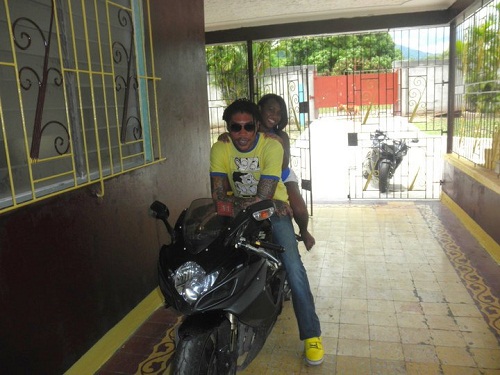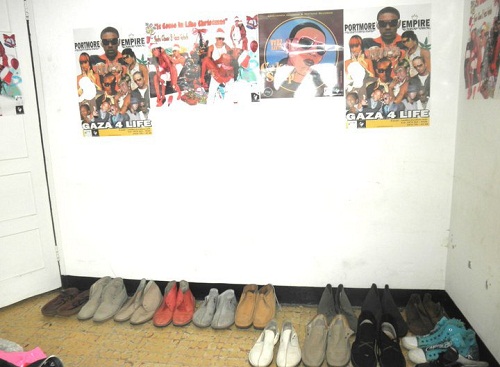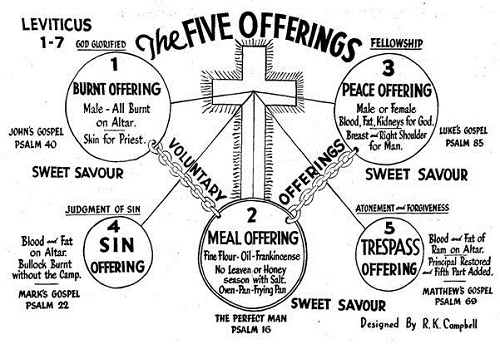IMMIGRATION NEWS! IT A GET TUFF
MONTGOMERY, Ala. – Alabama vaulted past Arizona on Thursday with what is being called the most restrictive law in the nation against illegal immigration, requiring schools to find out if students are in the country lawfully and making it a crime to knowingly give an illegal immigrant a ride.
Advocacy groups promised to challenge the sweeping measure, which like Arizona’s law also allows police to arrest anyone suspected of being an illegal immigrant if the person is stopped for some other reason. In addition, it requires all businesses to check the legal status of workers using a federal system called E-Verify.
“It is clearly unconstitutional. It’s mean-spirited, racist, and we think a court will enjoin it,” said Mary Bauer, legal director for the Southern Poverty Law Center.
It takes effect Sept. 1.
Republican Gov. Robert Bentley, who signed it into law Thursday, expressed confidence it would withstand any legal challenges.
“We have a real problem with illegal immigration in this country,” he said. “I campaigned for the toughest immigration laws, and I’m proud of the Legislature for working tirelessly to create the strongest immigration bill in the country.”
Alabama has an estimated 120,000 illegal immigrants, a nearly fivefold increase from a decade ago, according to the Pew Hispanic Center. Many of them are believed to be working on farms, at chicken processing plants and in construction.
One of the legislation’s sponsors, GOP Sen. Scott Beason, said it would help the unemployed by preventing illegal immigrants from getting jobs in the state. Alabama’s unemployment rate stood at 9.3 percent in April, the most recent figure available.
“This will put thousands of Alabamians back in the work force,” Beason said.
The Alabama Business Council has not taken a public stand on the law. In neighboring Georgia, some farmers and business owners warned that a crackdown passed recently in that state would make it more difficult to hire the laborers they rely on — many of whom are illegal immigrants.
The Alabama measure instantly puts the state at the forefront of the immigration debate. Organizations such as the American Civil Liberties Union and the Southern Poverty Law Center agreed that it is the nation’s toughest crackdown on illegal immigration.
Linton Joaquin, general counsel for the National Immigration Law Center in Los Angeles, said the Alabama law covers all aspects of an immigrant’s life.
“It is a sweeping attack on immigrants and people of color in general. It adds restrictions on education, housing and other areas. It is a very broad attack,” Joaquin said.
Among other things, the law makes it a crime for landlords to knowingly rent to an illegal immigrant.
Another provision makes it a crime to transport a known illegal immigrant. Arizona’s law appears narrower: It includes language against human smuggling and makes it illegal to pick up laborers for work if doing so impedes traffic.
Alabama’s law also goes further in requiring schools to check the immigration status of their students. The measure does not prohibit illegal immigrants from attending public schools; lawmakers said the purpose instead is to gather data on how many are enrolled and how the much the state is spending to educate them.
Jared Shepherd, an attorney for the ACLU, warned that because of that provision, some immigrant parents may not send their children to school for fear of arrest or deportation.
Activists such as Shay Farley, legal director of Alabama Appleseed, an immigrant advocacy group, said the bill invites racial profiling not only by law enforcement officers but by landlords and employers.
“It’s going to make us profile our neighbors and our church brothers and sisters,” Farley said.
Alabama’s Hispanic population more than doubled between 2000 and 2010 to 186,000, or 3.9 percent of the state’s nearly 4.8 million people, according to the Census.
Some farmers and other small businesses had hoped to be exempted from having to verify the immigration status of employees, fearing the database would be too costly and add too much red tape. Georgia’s law, by contrast, exempts businesses with fewer than 10 employees.
Alabama’s measure was modeled on Arizona’s. A federal judge blocked the most controversial parts of Arizona’s law last year after the Justice Department sued.
That includes the provision that required police to check people’s immigration status while enforcing other laws if there was reason to believe the person was in the country illegally. The case appears headed for the U.S. Supreme Court.
A less restrictive law in Utah also was blocked after a lawsuit was filed. Civil liberties groups have sued to stop Georgia’s law as well.
INSIDE EMPIRE SEKKLEMENT
I am really wondering if this a Swallowfield Ave whey di light teefing really a gwaan……….. kaw di place whaa do ova ..light a di least a di problem..Shirley a whey yuh get people decent likkle pickney kak up wid, yuh nuh si seh she nah bleach and she nuh ina your speed? A yuh seh bleach an tattoo..Anyhoot yuh tun dung di aircondition or yuh a mek runs a road tuh much? Face a get black and di han dem white like yuh a sleep pan dem..Give or take 20 pair a shoes all ina di same color range yuh only si grey and different shades wherein?? One red shoes an one brown di res and grey a cousin..no pillow pan di bed di dirty clothes basket nuh too far off..whappen gaza bwoize nuh duh house keepin?
GOODMORNING!
The name in Hebrew was ‘olleh’, meaning ascending as smoke, given because this sacrifice was to be wholly consumed and to rise in smoke toward heaven. There is also the poetic term ‘kalil’, complete (Deut 33:10, 1 Sam.7:9, Psa 51:19) or the Greek ‘Holokautoma’ (Mark 12:33, Heb.10:6) alluding to the fact that, with the exception of the skin or feathers, it was wholly and entirely consumed. The victims in other sacrifices were only partially consumed upon the altar.
The description of the burnt offering is found in Leviticus 1:1-17 and we shall look at the various verses to understand the purpose of the offering. verses 3, 10, 14. ‘from the herd’, ‘from the flock’, ‘of birds’. The offering was according to possession, which it was thought denoted a man’s standing in society and before God. If the social standing of the offerer was such that he owned a herd then he should offer a bullock. A lamb was not acceptable to God from him. If, however, the offerer did not own a herd but did have a flock, then his offering must be a sheep or a goat. If neither a herd or a flock were owned, then the offering should be a bird (turtledoves or pigeons). This offering was made by Mary, the mother of Jesus, at the time of her purification, which indicates that Jesus was born of parents who were poor and of low social standing.
These verses also show that the offering from the herd and the flock had to be male and without defect but the offering of birds in verse 14 placed no such conditions thereby allowing the poor to bring their offering. The lesson here is that God expects each man to give to Him according to his means, in acknowledgement that it is God who has prospered him. He will not accept inferior offerings. Genesis 4:4 -5 says that “Abel brought fat portions from some of the firstborn of his flock. The LORD looked with favour on Abel and his offering, but on Cain and his offering he did not look with favour.” Yet God does not expect from His people gifts, service, or anything that they do not possess. Our responsibilities are measured according to our privileges, not more than we have, not less than we have, always the best of what we have, without defect.
Man today more often gives God the things he does not want, what he no longer needs. The worn out or unfashionable clothes given to the charity shop. The unwanted furniture and the threadbare carpet sent round to the church. We set out to make our fortune, or gain that which the world offers, and only then give the remaining years to the Lords service. No one is suggesting that God won’t or can’t use those years, But God asks for the firstfruits not the leavings, for that which is of costs to us, not for that which is paltry (Malachi 1:7-8). Verse 3 also tells us that the offerer brought his sacrifice to the entrance to the court to present it, an individual as a special act of worship. The burnt offering was given for the whole of Israel regularly every morning and evening (Exodus.29:38-42). Each Sabbath, double that of the daily offering (Num.28:9). At the new moon, the three great festivals, the day of atonement and the feast of trumpets. Special Burnt offerings were made for the consecration of priests (Exodus,29:15), at the purification of women (Lev.12:6), at the cleansing of lepers (Lev.14:19), the removal of other ceremonial uncleanness (Lev.15:15), and on the accidental breach of the Nazarite vow, or its conclusion (Num.6:11). While the freewill burnt offering was given on any solemn occasion e.g. the dedication of the tabernacle (Num. chapter 7) and of the Temple (1 Kings 8:64).
Verse 4 tells us that the offerer laid his hands upon the sacrifice as a means of identification with the animal. The animals acceptance meant the acceptability of the offerer, it was an act of worship, the offerer presented himself before Jehovah as a worshipper, desirous of being accepted. The words ‘to make atonement for him’ according to B.W. Newton mean literally ‘to place a covering over him’ causing him to be acceptable.
Verse 5 says that the offerer had to kill the sacrifice, no one did it for him, he did it himself. Our identification with the animal and its death is like a laying down our lives, complete submission of our will to Gods that we may worship him. The priests would sprinkle the blood of the sacrifice against the sides or at the base of the altar. The sprinkling of Blood was like pouring out of life as it was believed that the life is in the blood. Verse 6 has the offerer skinning and cutting it into pieces. The skin being the only part of the animal that wasn’t burnt, the skin being a memorial of the death of the sacrifice. The skin provided him with a covering, a robe of righteousness, reminding us that God had to kill an animal to clothe Adam and Eve with it’s skin covering their embarrassment. The skin was kept by the priests as their portion, the offer left not with the physical covering but with the spiritual covering and the sense that God had provided everything. We see Christ’s sacrifice as clothing us with righteousness and that he takes away our embarrassment as we enter God’s presence to worship him.
In verses 7-9 the priests prepared the altar and placed on it the head and the fat. The offerer washes the inner parts and the legs with water before the pieces were placed on the altar by the priests so that it was all burnt. The inspection meant there was no outward blemish the washing showed there was no inward blemish. Christ was scrutinised both outwardly and inwardly by man and God respectively. Man could find no fault in him and God could see no fault in him. The different parts described in these verses represent and indicate the fullness or completeness of the sacrifice:
The Head – represents the mind and the intellect
The Inwards – represents the will and emotions
The Legs – indicate walk which represent conduct and lifestyle
The Fat – represents health and virility.
It says the offering was by fire, remember the animal was provided by God, for it was given in proportion to His provision, but the fire was also from God being originally kindled by Him. It was an aroma pleasing to the Lord. The symbolism or typology of the ceremony sets forth Christ offering himself without defect to God in performing the divine will with Joy, even to the point of death. In the offering the note of penalty is not conspicuous (Heb.9:11-14, 10:5-7). The offering is a sweet savour, so called because they deal with Christ in His own perfection and in His perfect devotion to the Father’s will. They are in contrast to the non-sweet savour offerings which typify Christ as carrying the sinner’s transgressions. The whole burnt offering is both atoning and substitutionary, Christ dies in the believers stead. The acceptableness or merit of the offering passed to the believer, and he is accepted by God in the place of and because of the blemishless offering.
Thoughts for Simple Sermons:
1/ God expects us to give out of the bounty that he gives to us, in proportion to that which he has given. God does not expect the left overs, the worn out or the discarded.
a) Let us consider the time we give to God in private prayer or worship.
b) Let us think about the time we give to serving the church.
c) Let us review the time we give in cherishing and loving our spouses and family. God, his family and our family deserve the best, let us commit ourselves to giving that quality time.
2/ God provided the animal and the fire, He gave Moses the pattern to be followed in the construction of the tabernacle. All this to have communion with the Israelites. God loves us so much he provided everything we need as well to have a relationship with him. He sent Jesus who became our sacrifice.
3/ The whole offering was given by the offerer and God wants no less of us. Paul says to the Romans in verse 12:1 “Therefore, I urge you, brothers, in view of God’s mercy, to offer your bodies as living sacrifices, holy and pleasing to God–this is your spiritual act of worship.” God wants all of us, wholly given over to him and just as the offering was washed, God wants us to wash at the laver of his word our minds, intellects, will and emotions, our conduct and lifestyle.
BANGLED FOR BRIDGING!
 Elephant man arrested for BRIDGING LIGHT…………who next? Why unno woa leave jps tings alone? Ele yuh tap bleach eno suh yuh nuh need much aircondition-MENT…Yuh likkle sticky finga brute yuh..Obeah ile nuh need refrigeration suh mi waa know is wha suh…di hair dye dem need special temprecha??? Suh wait nuhbaddie ina di music business nuh waa pay light agen? Electric Ele how yuh FEEL??????????? Dem kallah yuh up..kyaat yuh off guh infront a judge sed time fi di light teefin..HOW U FEELIN?? LIGHTY??
Elephant man arrested for BRIDGING LIGHT…………who next? Why unno woa leave jps tings alone? Ele yuh tap bleach eno suh yuh nuh need much aircondition-MENT…Yuh likkle sticky finga brute yuh..Obeah ile nuh need refrigeration suh mi waa know is wha suh…di hair dye dem need special temprecha??? Suh wait nuhbaddie ina di music business nuh waa pay light agen? Electric Ele how yuh FEEL??????????? Dem kallah yuh up..kyaat yuh off guh infront a judge sed time fi di light teefin..HOW U FEELIN?? LIGHTY??
****RULES**** 1. Debates and rebuttals are allowed but disrespectful curse-outs will prompt immediate BAN 2. Children are never to be discussed in a negative way 3. Personal information eg. workplace, status, home address are never to be posted in comments. 4. All are welcome but please exercise discretion when posting your comments , do not say anything about someone you wouldnt like to be said about you. 5. Do not deliberately LIE on someone here or send in any information based on your own personal vendetta. 6. If your picture was taken from a prio site eg. fimiyaad etc and posted on JMG, you cannot request its removal. 7. If you dont like this forum, please do not whine and wear us out, do yourself the favor of closing the screen- Thanks! . To send in a story send your email to :- [email protected]

 Play Video
Play Video








Recent Comments